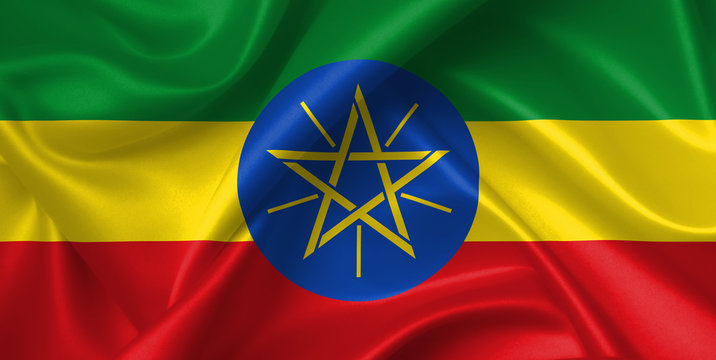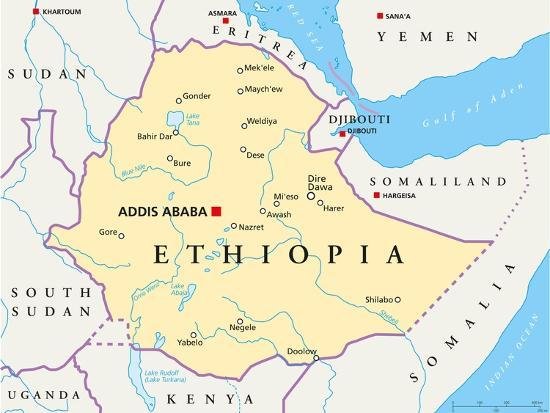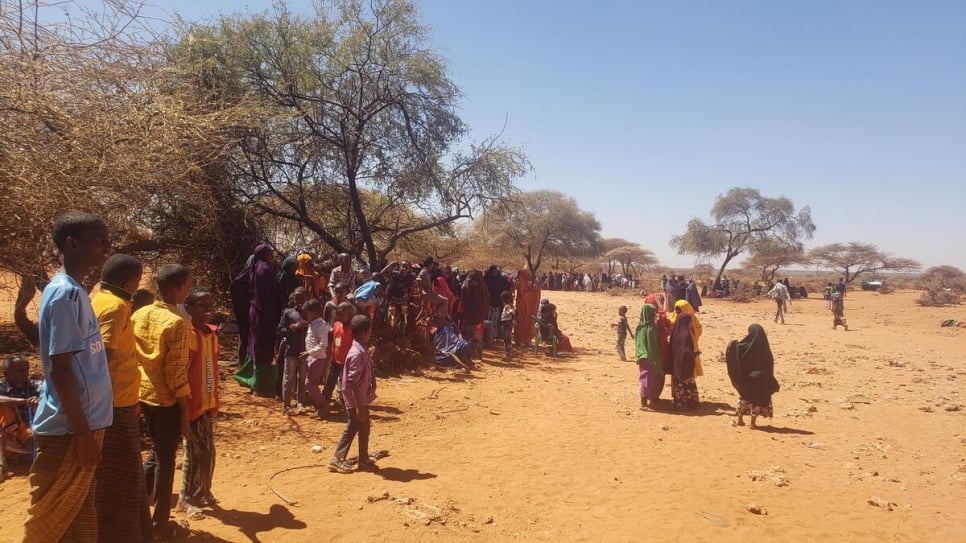
In 1960 Bob Gowan was the minister for the Church of Christ in Gridley, California and also served as a principle for an elementary school. He and his wife, Wandean had searched for places where the church had no mission outreach and discovered Ethiopia was one. At the same time, Carl Thompson was serving as the minister for the Church of Christ in Chico, California. Bob and his wife visited with Carl and Willadean in Chico about going as a team to Ethiopia to establish the church. Bob also wanted to establish a school to help the illiteracy problems there. They decided to accept the challenge and opportunity to move to Ethiopia. Psalms 68:31, “…..Ethiopia shall soon stretch forth her hands to God”, was chosen as their theme and became the logo for their newsletter, “Hands Across the Sea”.
The Ethiopian government required that any religious group that came to teach “their doctrine” would be required to establish a humanitarian work for the Ethiopian people in exchange for being allowed to teach their religion.
Carl met an Englishman, Edgar Marlar, on a street in the business center of Addis Ababa. Edgar worked for UNICEF and in a short conversation the man suggested that the Church of Christ establish a School for the Deaf. There were no deaf schools in the country of Ethiopia at that time. Carl and Bob decided that a School for the Deaf would be a great blessing for the deaf children and the country. A little later, the daughter of King Haile Salassie, Princess Tegnaye Worq provided land on the outskirts of Addis Ababa to build the school and in 1963 the Amaha Desta School for the Deaf was opened with a student body of 12 students. (This school is now called the Makanissa School for the Deaf) This school provided legal recognition from the government for the gospel to be preached in the city of Addis Ababa.
There were other challenges in Ethiopia that had to be addressed:
- There were 86 different tribal languages in the country
- There were over 200 dialects of these distinct tribal languages. Traveling 20 miles in any direction would usually take you into a new language area.
- The bible in Ethiopia had been translated into only 3 of those languages.
- The denominations had been there for many years and had divided the country into “parishes” and they respected each other’s territory making it difficult for a new group to preach anywhere except in Addis Ababa.
- There were very few normal government schools in the countryside. The denominations had set up schools and the only students allowed in those schools were member’s children of the denomination that had established the school.
- Government officials in the countryside had been educated in the schools located in their areas and they were very loyal to the denominational group that had provided their schooling. This made it extremely difficult for an American missionary to go and preach anywhere. Without a humanitarian work in those areas legal status from the National Government could not be obtained.
- More than 50 percent of the population of Ethiopia was Orthodox and 40+ percent were Muslim. Each of these groups were very protective of their status and were politically able to bring serious problems on anyone trying to evangelize their members.
Because of these challenges, as well as others, reaching out with the gospel was limited during the early years. In 1964 an aggressive American gospel preacher named Artie Reed was sent to Ethiopia from the Central Church of Christ in Stockton, California. Artie was a light skinned African American and he could get on a mule, wrap himself in an Ethiopian shama and he looked just like an Ethiopian. This made it possible for him to travel in the countryside and preach with an interpreter and not be recognized as an American until he opened his mouth. The response to Artie’s message was good even though he was arrested on different occasions. By the end of 1967 there were a total of 8 known congregations of the Lord’s church in Ethiopia with a combined membership close to 300. Artie had broken down the “parish” lines drawn by the denominations as the people came to recognize how their lives had been and was being controlled by the rules and regulations of those religious groups.
TRAINING GOSPEL PREACHERS:
My family was sent to Ethiopia in May of 1968. Recognizing that language was the greatest problem we faced, a plan was developed to train preachers from the different language groups based on two scriptures:
- Acts 2:8 “….we each hear them in our own language to which we were born…”
- 2 Timothy 2:2 “The things which you have heard from me in the presence of many witnesses, entrust these to faithful men who will be able to teach others also.”
By 1968 the government had established a public school system in the countryside of Ethiopia. The government decided that two languages would be taught in the schools: Amharic and English. Amharic was made the official business language in Ethiopia at that time, so any man who completed at least the 8th grade had the ability to speak, read and write the Amharic language. This made our plan possible to go forward:
- To establish a short term (Four months) School of Preaching for men who were fluent in the Amharic language. A decent translation of the bible was available in Amharic.
- The aim of the curriculum would be to teach the following: God’s Plan for Redeeming Man, The New Testament Church, Old and New Testament Survey, The Epistles, The Book of Acts, Worship in the New Testament Church, A Practical Class on Preaching and a 13 lesson printed Correspondence Course on “The Bible Says” for the men to take back home with them to use as lessons to teach the basics of New Testament Christianity in their home areas.
- Admission to the school required that each man must be sent by a congregation of people. They didn’t have to be members of the church because we were sure the man would be converted during our study with him. (This proved to be true; after training more than 1300 gospel preachers, only two men have left the school that have not obeyed the gospel)
- The church that sent the man had to sign a letter of understanding that the man they sent would not be supported by us and that he was to be considered their member and if they chose to support him, that would be their responsibility.
- Our aim was to develop a staff of Ethiopian Preacher Training School instructors. (This was accomplished by 1971)
- To eliminate the American missionary presence as soon as possible. (The last American missionary left Ethiopia in 1976. The Ethiopian work has been accomplished by our Ethiopian brethren since that time. Our involvement has been to facilitate the needs they have as they go out to preach among their own people.)
The only School of Preaching from 1968 through 1973 was located in Addis Ababa. A Communist (Scientific Socialistic) government disposed of Emperor Haile Salassie in 1974. The removal of individual rights and religious freedom during the 17 years that followed made it impossible to bring men from the countryside to train them. When the Communists were defeated in 1991, we reopened the school in Addis Ababa. (The church grew during the Communist occupation to more than 250 congregations.) There was a great need for trained gospel preachers so a second School of Preaching had been started in Santariea, Sidamo in 1974. (345km south of Addis Ababa) Because of the language problem and the growing need for preachers, additional schools were opened in Jajura, Ethiopia in 1998 and in Nekemte, Ethiopia in 2005. One hundred and five men are trained each year at these Level One Schools.
The School of Preaching in Addis Ababa became a Level Two School. Preachers who have excelled in evangelism and church plantings are selected to attend the Level Two program. Ten to twenty men graduate each year from the Level Two training program.
A new Level One School of Preaching has now been constructed in Shone, Ethiopia and was opened in April 2012. This school will add an additional 20 gospel preachers and trained church leaders for the congregations in the Badewatcho, Wollieta, Kambatta and Hadiya areas. This school will concentrate on training preachers for the new churches established through the Water Well Evangelistic Outreach. As of April 2013, 125 new congregations had been started as preachers went to preach where water wells had been completed.
PARTNERSHIP WITH SUNSET INTERNATIONAL BIBLE INSTITUTE:
Twenty years ago we signed an agreement with the Sunset International Bible Institute in Lubbock, Texas making our Schools of Preaching Associate Branch Schools of the Sunset program. In the following few years they sent teachers to provide Master Teacher Certification training for our Ethiopian instructors. They also provided the same curriculum that is taught to their resident students in Lubbock. These lessons and other materials supplied by them were translated into the Amharic language and are now used as the curriculum at all our training schools.
A WORD ABOUT FINANCES:
There are no Americans paid from the Ethiopia Mission Fund. For 30 years my business made it possible for me to work in behalf of the Ethiopian Outreach without a salary. I sold my business in 1998 and have worked as a full time volunteer for the Ethiopian ministry since that time. In 2007, I was diagnosed with an incurable form of lymphoma and have been undergoing treatment since that time. My son, Kevin, has started to work with me and will assume what I do when I am no longer able to work and travel. Kevin is a deacon at the Woodward Park Church of Christ. He has already made several trips to Ethiopia with me.
Travel expenses for trips to Ethiopia must be paid for by those who go. Funds contributed for the Ethiopian Gospel Outreach do not provide travel funds and expenses for any one. That includes the trips that Kevin and I take twice each year; I have always paid for them and with God’s blessing, I will continue to do so. The brethren from the Sunset International Bible Institute pay for their travel expenses as does any American preacher or teacher that goes to help in the work.
Thank you for the time you have given to read and consider the information provided.
John Ed Clark, elder Woodward Park Church of Christ
Ethiopian Mission Outreach
Email: cachr@comcast.net
Church Office Phone: 559 446-2550
Home Phone: 559 436-8009
Cell Phone: 559 930-6716
Kevin Clark, deacon
Cell Phone: 559 355-8148
Email: kevin_l_clark@yahoo.com
FACTS ABOUT THE GOSPEL OUTREACH TO ETHIOPIA:
800 Known Congregations of the Lord’s Church.
5 Schools of Preaching:
- Jajura School of Preaching, Level One—40 men are trained each year
- Santariea School of Preaching, Level One—20 men are trained each year
- Nekemte School of Preaching, Level One—20-25 men are trained each year
- Addis Ababa School of Preaching, Level Two—10-20 men are trained each year
- Shone School of Preaching, Level One—20 men are trained each year
- 1800+ Trained Gospel Preachers and Church Leaders have graduated as of 2013
5 Christian Schools for the Deaf:
- Makanissa School for the Deaf—270 students
- Santariea School for the Deaf—109 students
- Mazoria School for the Deaf—64 students
- Nekemte School for the Deaf—42 students
- Awasa School for the Deaf—140 students
3 Christian Kindergartens:
- Shinshicho Kindergarten—106 students
- Jimma Kindergarten—106 students
- Nekemte Kindergarten—106 students
2 Computer Training Centers:
- Awasa World English Institute Computer Training School—60 students/year, including men and women sent to our school from various government offices and our upper level Deaf School Students
- Addis Ababa Computer Training School—Trains 40 men and women, including members of the church, teachers and government workers and trains our upper level Deaf School Students
2 Drip Irrigation Training Sites:
- Shone and Jajura, Ethiopia

